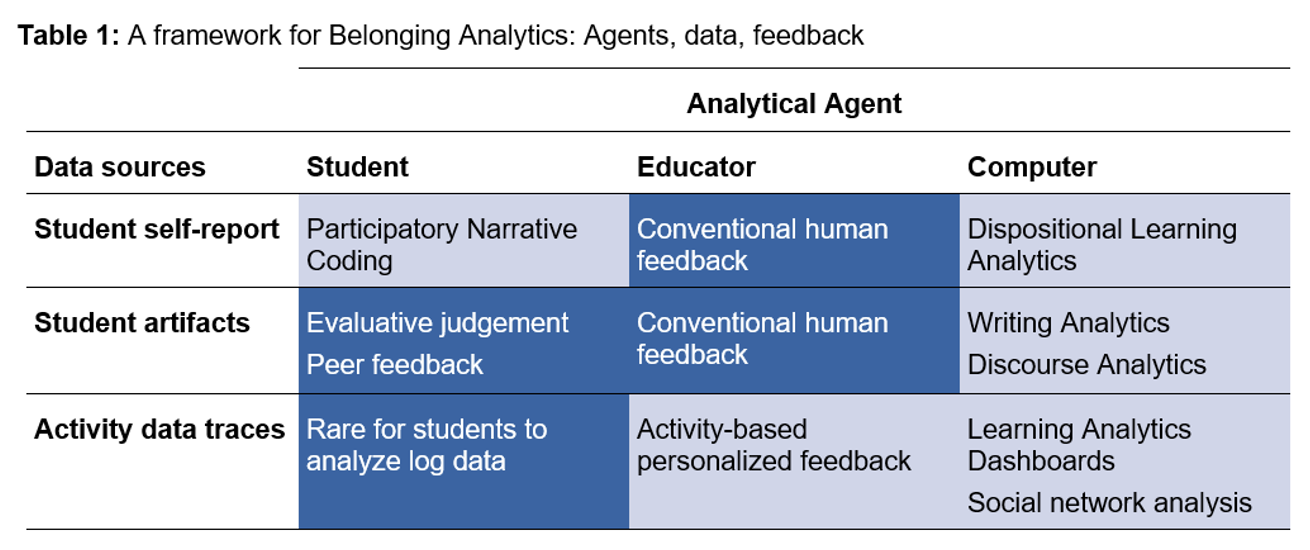
Connecting the fields of student belonging and learning analytics: “Belonging Analytics”
As with every purposeful human endeavour, motivation for learning and becoming a professional within a discipline is enhanced when individuals feel a sense of belonging. In the context of education, belonging refers to students’ subjective feeling of being a valued member of the learning community, that comes from a sense of connection with others as well as to the course of study. This affective dimension of engagement has notable links with many positive learning outcomes, including transition, retention, success and well-being. The importance of belonging has been underscored by the recent COVID-19 pandemic and subsequent increase in online, remote learning, and more students found themselves learning in isolation. The issue is further compounded for students from equity or disadvantaged groups, who already feel a lower sense of belonging.
Notwithstanding the pandemic, students’ experiences of belonging is dynamic and contextual, which presents challenges for tracking and supporting students in a timely manner. Traditional research methodologies such as surveys and interviews, may be useful sources of data for understanding student belonging, however these are difficult to scale and repeat over multiple episodes.
 In response to the urgency of student belonging, CIC researchers Lisa-Angelique Lim and Simon Buckingham Shum are collaborating with belonging experts Peter Felten and Jennifer Uno (Elon University, USA), to conceptualise a scalable approach to this important issue.
In response to the urgency of student belonging, CIC researchers Lisa-Angelique Lim and Simon Buckingham Shum are collaborating with belonging experts Peter Felten and Jennifer Uno (Elon University, USA), to conceptualise a scalable approach to this important issue.
In a new paper, we explore the possibility of harnessing learning analytics to monitor and support belonging in timely and personalised ways. Drawing on examples of where learning analytics has been used for personalising feedback to students, we propose a framework for “belonging analytics”, based on the dimensions of agents, data, and feedback mechanisms.
 Overall, our framework suggests approaches that leverage a range of quantitative and qualitative data to monitor and support student belonging over time and at scale. Clearly, as with other substantial learning concepts, much care is needed to ensure that any approach drawing on learning data to inform belonging must be firmly grounded in theory, and that analytical approaches do not foster inequity. We conclude the paper with further questions to explore in this new field.
Overall, our framework suggests approaches that leverage a range of quantitative and qualitative data to monitor and support student belonging over time and at scale. Clearly, as with other substantial learning concepts, much care is needed to ensure that any approach drawing on learning data to inform belonging must be firmly grounded in theory, and that analytical approaches do not foster inequity. We conclude the paper with further questions to explore in this new field.
Learn more…
Read:
-
- Needed Now: Belonging@Scale
- Lim, L.-A., Buckingham Shum, S., Felten, P. and Uno, J. (2023). “Belonging Analytics”: A Proposal. Learning Letters, Vol. 1, Article 4, 1-12.
Watch: We recently presented these ideas in a webinar at the recent Indiana University Learning Analytics Summit.
Engage: Finally, just as belonging is inherently relational, we invite educators and researchers with a shared interest in this topic, to be part of a new Belonging Analytics community on LinkedIn. We look forward to building this community together with you.